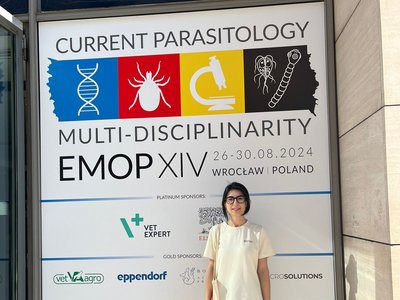

This prestigious event, held every four years, brought together leading researchers and professionals to discuss the latest findings on parasites, diseases, and vectors, with a focus on their impact on human health and control strategies. As a Ph.D. student supported by the Austrian Development Cooperation presenting at the EMOP was an important opportunity to network with leading experts and explore opportunities for collaboration, particularly in expanding the scope of my research to include wildlife vectors.
Our scholarship holder presented her research on vector-borne diseases in Armenia, with a particular focus on Leishmania and Dirofilaria species, to an international audience. Ultimately, she gained insight into the latest diagnostic techniques, research methodologies and control strategies that can be directly applied to her ongoing Ph.D. research.
According to Seda, attending the EMOP conference was an invaluable experience that exposed her to cutting-edge research in parasitology and vector-borne diseases. The lectures provided advanced knowledge on disease detection methods, including DNA extraction, PCR with specific primers, and data analysis. In addition, practical sessions offered advice to young scientists on publishing strategies and overcoming academic challenges. By interacting with international scientists, she discussed her work, received valuable feedback, and explored potential collaborations. This experience greatly enhanced her understanding of disease ecology and inspired new directions for her research.
This opportunity was instrumental in allowing her to present my work, connect with global experts, and further my research ambitions. The skills and connections gained at the conference have had a direct impact on her research trajectory, enabling her to make a meaningful contribution to the field of zoonotic disease.
Her poster, titled "Leishmania and Dirofilaria Species in Dogs in Armenia," examined the prevalence of these parasites in domestic dogs throughout Armenia and highlighted the potential implications for both animal and human health. This study contributes to a better understanding of vector-borne diseases in a region undergoing significant ecological change and highlights the importance of considering both age and treatment history when assessing risk of infection.
The study focused on the prevalence of Leishmania spp. and Dirofilaria spp. in domestic dogs in Armenia. We collected blood samples from 60 dogs in 17 locations and tested them using rapid tests and PCR. While no dogs tested positive for Leishmania, 13 were found positive for Dirofilaria, mainly those living outdoors. Our results indicate that older dogs are less likely to test positive for Dirofilaria in PCR results, even when previous treatments are considered. This study highlights the need for broader screening, including wildlife, to better understand disease transmission in Armenia.
Seda Adamyan is a PhD candidate at the Medical University of Vienna, specializing in the role of jackals in the diversity and distribution of zoonoses, especially Leishmania and Dirofilaria spp. in Armenia. Her research examines the ecological and environmental factors that contribute to the transmission of these vector-borne diseases. Seda holds a master’s degree in biology from Yerevan State University and has participated in international research projects, including studies on parasitic infections in domestic animals. She has presented her findings at conferences such as EMOP, highlighting the link between wildlife disease ecology and public health. Seda is passionate about exploring the dynamics of zoonotic diseases to improve health outcomes for both animals and humans.
